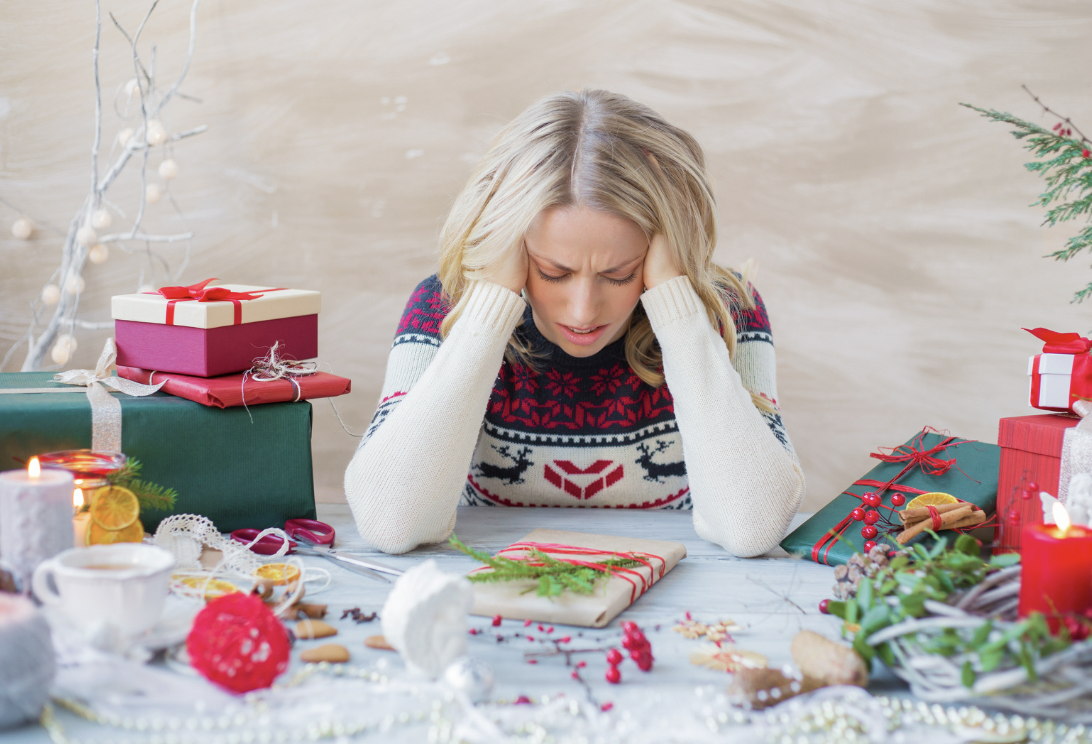
It’s winter and the holiday season is upon us. And with it comes Christmas carols, Kwanzaa feasts, the lighting of the hanukkiyah (commonly called a menorah) on Hanukkah, and more.
While the holidays are a time for gathering with loved ones, they’re also notorious for being stressful.
In fact, according to the American Psychological Association, 38% of people feel more stress during the holidays. Only 8% of people said the holidays make them feel happier.
And yet, we keep celebrating year after year. So, why not try to reduce the stress a little?
Today, to make the holidays as enjoyable as possible, we’ll talk about 5 practical tips to get through them (relatively) unscathed.
1. Don’t Expect Perfection
It’s easy to get caught up in the fantasy of the holidays, especially with the influence of highly curated social media posts.
Maybe we want our kids to be perfectly behaved for their picture with Santa. Or maybe we want our Hanukkah sufganiyot to be sugar coated picture-perfection.
But extra self-imposed pressure is a recipe for disaster. Unexpected things will happen, and stuff won’t be perfect. And that’s okay.
We should try to be realistic and accept that we can’t control everything. That way, we can engage fully with the festivities, rather than worrying about how they “should” be.
To help, we can try some self-compassion.
E.g. we’re worried that the house isn’t tidy enough for guests. To ourselves, we can say, “I feel self-conscious about the house, and that’s okay. Plenty of people feel this way during the holidays. This season is about making lovely memories with people I care about. The house doesn’t have to be perfect to have a great time.”
2. Keep Routines
It’s tempting to ignore our regular routines in the name of the holidays. Trading in protein shakes and dumbbells for hot cocoa and cozy socks? Yes please!
But we established routines for a reason, likely because they’re good for us.
During this hectic time, it’s important that we maintain a stable routine (or as close as possible).
This includes exercising, eating healthy, doing physical hygiene and emotional care (like therapy and chatting with friends), sleeping, etc.
3. Limit Alcohol
Tis the season to be tipsy.
There’s no denying that alcohol can take the edge off during the holidays. Awkward conversations with that estranged, questionable cousin? Easy. Underlying family tensions that no one is talking about. Gone. Social anxiety? Never heard of it.
The downside? The effects of alcohol are temporary, and sometimes harmful.
Alcohol can make us feel worse while we’re drinking. Because it lowers our inhibitions, we may struggle to control our emotions. This may make us feel more sad, angry, or irritated than before we started drinking.
Then, there’s the dreaded hangover, which is actually a combination of symptoms, like:
- Dehydration
- Lack of sleep, which causes fatigue and irritability
- Alcohol detox, which includes feeling restless, jittery, or anxious
- Alcohol intolerance, which includes headaches, fatigue, fast or pounding heartbeat
- Shame or regret from things said/done while drinking
Dealing with these symptoms will only make the holiday season more stressful.
Drinking a moderate amount is the wisest solution to avoid this.
4. Set Boundaries
Sometimes, the holiday season can be so hectic that we’re completely exhausted half-way through.
This is especially true for those of us who struggle to say “no”.
We might feel guilty for denying invitations or letting people down. Maybe we tolerate harmful behavior from family members to “keep the peace”.
But running ourselves ragged (physically or emotionally) is a quick way to make the holidays feel terrible.
Instead, we should practice setting healthy boundaries. These help us communicate our needs and limits.
E.g., our aunt is insisting we come to her house for brunch, but we’re feeling exhausted. We can say, “I really appreciate the invitation, but I won’t be coming. I need some time to recharge.”
Another example:
E.g., our cousin keeps using racist language at family dinner. We can say, “If you keep saying these things, I’ll remove myself from this conversation.”
We’re responsible for upholding our own boundaries. This should be done in an assertive way, but doesn’t need to be rude or aggressive.
If people don’t understand, that’s okay. It might feel uncomfortable. That’s normal, especially if we’re not used to setting boundaries.
Honoring our boundaries ensures we have energy to be fully present in the activities we choose to do.
5. Budget and Stick to It
Holiday season can lead to full hearts and empty wallets.
Common expenses include food, decorations, travel, clothing, activities, and gifts.
Overspending, whether accidentally or because we feel pressured to, causes unnecessary financial strain.
To avoid this, we should make a holiday budget and stick to it. While this is best done earlier in the year, now is still a good time to start.
It can also be helpful to discuss financial limits with family and friends. That way, everyone is on the same page.
Summary
The holidays are an excellent time to connect with those we love, eat treats, and enjoy the atmosphere.
But if we’re not careful, we can get swept up in a stress-fueled frenzy. To reduce stress, we should prioritize our well-being.
Realistic expectations, clear boundaries, healthy routines, moderate alcohol, and mindful spending can make this holiday season a success.
Sources



